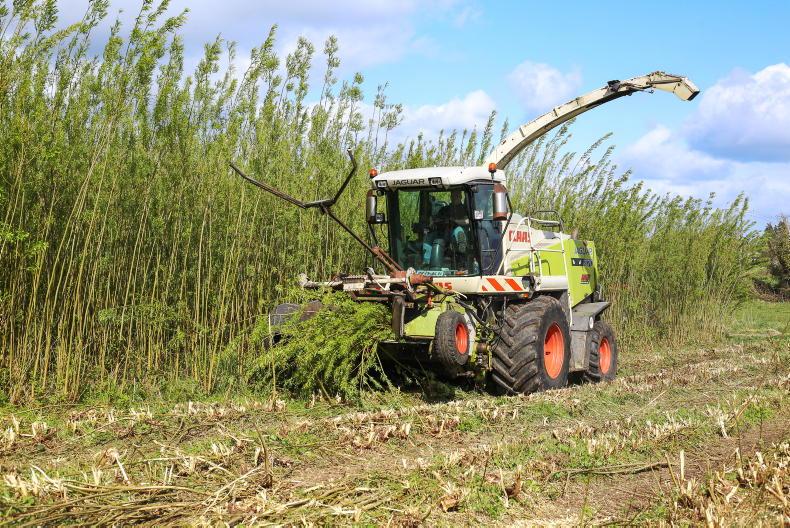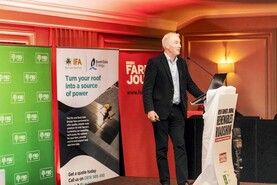The Irish Farmers Journal Renewable Roadshow is set to kick off in April. Over the month, we will be travelling to Cork, Kilkenny, Cavan, and Athlone for four free events. Over the four evenings, we will outline how solar PV, generating renewable heat, anaerobic digestion, and retrofitting your farmhouse can improve the economic and environmental sustainability of your farm.
The first session of the night will focus on renewable heat and the opportunities for farmers and businesses. Reducing emissions from heat remains one of the real problem areas for Ireland. Heat-related greenhouse gas emissions from the use of fossil fuels in our homes and industry accounted for 13.1 MtCO2 of emissions in 2021, which is equivalent to 37% of total energy-related emissions or 21% of total national greenhouse gas emissions.
When it comes to decarbonising heat and replacing it with renewables, we stack up really badly. In 2021, the share of renewables in heat generation was just 5.2%, far short of a 12% target. Currently, we stand at around 6%, far short of the 22% EU average. This is a nut we are struggling to crack. However, as a result, it presents good opportunities for farmers and businesses to move away from oil, gas oil, or natural gas.
Topics
The Irish Bioenergy Association’s Sean Finan and Noel Gavigan will lead the discussion on renewable heat. The talk will focus on the
opportunities for grant aid under the Support Scheme for Renewable Heat (SSRH).
The €300m scheme was launched in 2019 and provides support for farms and businesses to use renewable heat. There are two forms of financial support available to eligible businesses. The first is a 40% grant towards the cost of installing an air, ground, or water source heat pump.

What are the options for heat pumps on farm?
The second is a tariff that provides ongoing payment per unit of heat from biomass or biogas heating systems for up to 15 years. Up to €3.5m is available over the 15 years per applicant.
Grant aid for biomass boilers, as well as biomass drying and processing equipment, is also available under TAMS III. These options will be discussed during the talk.
Grant aid is also available for electric heating systems such as heat pumps as well as for heat recovery units under TAMS III. We will also delve into the opportunity of growing biomass for the heat sector.
The Renewable Heat Obligation
The session will give an update on the new Renewable Heat Obligation (RHO), a scheme being introduced to help decarbonise the heat sector. The RHO will introduce a mandatory renewable obligation this year for fuel suppliers within the heating sector.

Is there a future in growing biomass energy crops for the heat sector?
Essentially, this means that large suppliers of fuels like oil, gas, and coal will need to include a specific amount of renewables in their fuel mix under law.
The RHO is widely expected to help support the use of biomethane from anaerobic digestion plants for heating.
The second phase of consultation on the RHO focused on its design and closed in 2023. A total of 54 submissions were received which are being used to help inform the next stage of scheme design. A high-level scheme outline, which will contain information on the obligation commencement date, will be published later this year.
Heating your home
As well as the session on renewable heat for farms and businesses, there will also be a session on retrofit options for your home on the night. Improving heat retention and making your house easier to heat is essential if you decide to avail of grant aid for electric heating systems like heat pumps. Session three will run through all of the options and available grant aid for improving the energy efficiency of your home.
Speakers

Sean Finan CEO IrBEA will speak at the events.
IrBEA’s Sean Finan and Noel Gavigan will be talking about renewable heat on the night. Commenting on the event, Finan said “renewable heat generated from solid biomass presents an opportunity for farmers / businesses particularly in the pig, poultry, mushroom and horticultural sectors to change from fossil fuel and reduce emissions through the use of wood fuels. A 15-year operational support is currently available for this heat generation through the Support Scheme for Renewable Heat. There is also a potential opportunity for farmers and foresters to produce and supply biomass / wood fuels to fuel these systems. We look forward to exploring and presenting on all these opportunities during the upcoming Renewables Roadshow.”
The Irish Farmers Journal Renewable Roadshow is set to kick off in April. Over the month, we will be travelling to Cork, Kilkenny, Cavan, and Athlone for four free events. Over the four evenings, we will outline how solar PV, generating renewable heat, anaerobic digestion, and retrofitting your farmhouse can improve the economic and environmental sustainability of your farm.
The first session of the night will focus on renewable heat and the opportunities for farmers and businesses. Reducing emissions from heat remains one of the real problem areas for Ireland. Heat-related greenhouse gas emissions from the use of fossil fuels in our homes and industry accounted for 13.1 MtCO2 of emissions in 2021, which is equivalent to 37% of total energy-related emissions or 21% of total national greenhouse gas emissions.
When it comes to decarbonising heat and replacing it with renewables, we stack up really badly. In 2021, the share of renewables in heat generation was just 5.2%, far short of a 12% target. Currently, we stand at around 6%, far short of the 22% EU average. This is a nut we are struggling to crack. However, as a result, it presents good opportunities for farmers and businesses to move away from oil, gas oil, or natural gas.
Topics
The Irish Bioenergy Association’s Sean Finan and Noel Gavigan will lead the discussion on renewable heat. The talk will focus on the
opportunities for grant aid under the Support Scheme for Renewable Heat (SSRH).
The €300m scheme was launched in 2019 and provides support for farms and businesses to use renewable heat. There are two forms of financial support available to eligible businesses. The first is a 40% grant towards the cost of installing an air, ground, or water source heat pump.

What are the options for heat pumps on farm?
The second is a tariff that provides ongoing payment per unit of heat from biomass or biogas heating systems for up to 15 years. Up to €3.5m is available over the 15 years per applicant.
Grant aid for biomass boilers, as well as biomass drying and processing equipment, is also available under TAMS III. These options will be discussed during the talk.
Grant aid is also available for electric heating systems such as heat pumps as well as for heat recovery units under TAMS III. We will also delve into the opportunity of growing biomass for the heat sector.
The Renewable Heat Obligation
The session will give an update on the new Renewable Heat Obligation (RHO), a scheme being introduced to help decarbonise the heat sector. The RHO will introduce a mandatory renewable obligation this year for fuel suppliers within the heating sector.

Is there a future in growing biomass energy crops for the heat sector?
Essentially, this means that large suppliers of fuels like oil, gas, and coal will need to include a specific amount of renewables in their fuel mix under law.
The RHO is widely expected to help support the use of biomethane from anaerobic digestion plants for heating.
The second phase of consultation on the RHO focused on its design and closed in 2023. A total of 54 submissions were received which are being used to help inform the next stage of scheme design. A high-level scheme outline, which will contain information on the obligation commencement date, will be published later this year.
Heating your home
As well as the session on renewable heat for farms and businesses, there will also be a session on retrofit options for your home on the night. Improving heat retention and making your house easier to heat is essential if you decide to avail of grant aid for electric heating systems like heat pumps. Session three will run through all of the options and available grant aid for improving the energy efficiency of your home.
Speakers

Sean Finan CEO IrBEA will speak at the events.
IrBEA’s Sean Finan and Noel Gavigan will be talking about renewable heat on the night. Commenting on the event, Finan said “renewable heat generated from solid biomass presents an opportunity for farmers / businesses particularly in the pig, poultry, mushroom and horticultural sectors to change from fossil fuel and reduce emissions through the use of wood fuels. A 15-year operational support is currently available for this heat generation through the Support Scheme for Renewable Heat. There is also a potential opportunity for farmers and foresters to produce and supply biomass / wood fuels to fuel these systems. We look forward to exploring and presenting on all these opportunities during the upcoming Renewables Roadshow.”









 This is a subscriber-only article
This is a subscriber-only article











SHARING OPTIONS: